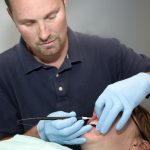
LIFE QUALITY RESOURCES
For further information about neurofeedback, biofeedback, and psychotherapeutic services offered by Drs. Dan and Lucy Chartier and their associates, contact:
Life Quality Resources offers: comprehensive mental health support services, including:
- Medication Management of ADHD, Depression, Anxiety, Insomnia
- Diagnostic Evaluation and Treatment of Adults with Attention Deficit/ Hyperactivity Disorder
- Depression and Anxiety Disorders
- Holistic approaches to mental health
LIFE QUALITY RESOURCES
5613 Duraleigh Road, Suite 101
Raleigh, NC 27612
Telephone: (919) 782-4597
The name of her practice—Life Quality Resources—says everything about clinical psychologist Lucy Chartier’s approach to mental health. “Optimal life quality,” she says, is the focus of the practice that her husband, Dr. Dan Chartier, founded 40 years ago. “Our goal always is to provide the support that each patient needs to help them attain and maintain a mentally healthy life.”
As a psychiatric nurse practitioner and clinical psychologist, Dr. Chartier brings a holistic perspective to her work, appreciating the interplay of mental and physical health issues. “Whether working with patients dealing with depression and anxiety, or with the challenges of attention deficit disorders (ADHD),” she says, “my focus is always on optimal functional health. This means going beyond medication management and counseling. It means understanding the importance of whole health, and of the lifestyle choices that are the critically important pillars of mental health and wellbeing: good sleep, nutrition, and exercise.
Lucy Chartier, PhD, NP, APRN-BC
Dr. Lucy Chartier holds a doctorate in clinical psychology and advanced education as a psychiatric/mental health clinical nurse specialist and nurse practitioner. She has been in private practice since 1984.
As a nurse practitioner, Dr. Chartier prescribes and manages adult patients’ psychiatric medications when necessary to contribute to the total treatment plan of promoting optimal patient mental/emotional health. Yet she remains committed to utilizing the most natural and organic approach to neurochemical support, including the use of non-pharmaceutical products and supplements, diet, and exercise to target imbalances and address clinical complaints. Dr. Chartier is a humanistic psychotherapist with a concentration in Cognitive-Behavioral therapy. She is a Fellow and certified specialist in Neurofeedback by the Biofeedback Certification Institute of America (BCIA), and a SABA certified QEEG Technologist. Additionally she is a certified specialist in child/adolescent psychiatric and mental health nursing and a certified adult psychiatric and mental health nurse practitioner by the American Nurse’s Credentialing Center.
“So, I see ‘medication management’ as more than adjusting dosages. Medications are powerful, often essential, tools in helping patients deal with depression or anxiety. But drugs are not going to replace being a healthy human or adopting increasingly healthy behaviors. The challenge is to develop the plan for each individual patient, where medications, counseling support, and behavioral changes work together in a healing path.”
The Challenges of Adult ADHD
The holistic approach Dr. Chartier uses is particularly effective in working with an increasing number of patients dealing with Attention Deficit/Hyperactivity Disorder (ADHD). “People often assume this is a childhood issue,” says Dr. Chartier. “But, while it can present differently in adults, ADHD can occur at any age and interfere—often seriously—with daily functioning.
“Many adults with ADHD aren’t aware they have it,” she notes. “They just know that everyday tasks can be a challenge. Adults with ADHD may find it difficult to focus and prioritize—issues that impact their work. Other symptoms—including impulsiveness, restlessness, and mood swings—also affect quality of life.
“Many of my patients—people in their fifties and sixties—have only recently realized the nature of lifelong challenges. A typical example is a woman who told me, ‘I’ve been struggling with this my entire life. I was never efficient at my jobs, and I contaminated relationships. I’ve always been scattered and could never finish things. But it wasn’t until my granddaughter was diagnosed with ADHD that I realized: I’m just like her!’ “Balancing the use of medications with behavioral changes and the use of non-pharmaceutical supplements is critically important in treating ADHD,” says Dr. Chartier. “I try to find that ‘sweet spot’ in the use of stimulants—where the dose is effective but not overpowering. The key is developing a plan for the individual patient.”










